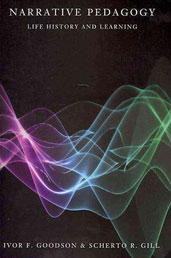Narrative Pedagogy
Learning and Narrative Pedagogy
The mystery of self is at the centre of education and learning because good teaching starts from there; and ultimately, the mystery of being human is reflected in the teacher’s narrative. This makes narrative exchange the precondition of pedagogy because learning is about becoming.
Narrative pedagogy also involves deep relationships. In Chapter Five, we discussed how the narrative process is a whole-person encounter that involves emotion, intuition, and the human spirit. The relationship between the teacher and the learner is the key to narrative learning. Nodding (2010) claims that relationship is ontologically basic. ‘Human beings are born from and into relation; it is our original condition’ (p. 390), and that approaching the world through a caring relation,
we are more likely to listen attentively to others. In a caring relation, the carer is first of all attentive to the cared-for, and this attention is receptive; that is the carer puts aside her own values and projects, and tries to understand the expressed needs of the cared-for (p. 391).
In Noddings’ terms, the carer is a teacher, and the cared-for, the learner. This withdrawing of the teacher’s values in order to attend to the projects of the learner is a non-judgemental approach to the learner’s narrative, which does not exclude the opportunity for the teacher to attend to what in the learner’s narrative is at odds with his/her own perspectives. We don’t see that Noddings’ claim here contradicts Gadamar’s view of integrating bias that arises from one’s tradition and horizons in the process of understanding the other, reviewed in Chapter Five. This is because by putting aside temporarily the teacher’s own projects, s/he focuses on the learner’s needs and projects in order to maintain a caring relationship. Meanwhile, to evaluate and respond to a wide range of needs expressed by the learner, the teacher ‘must expand the breadth of her competence’ (ibid. p. 391). Noddings suggests that to complete the relationship, the learner must recognise the teacher’s effort as caring. She writes:
The response of the cared-for is an act of reciprocity, but it is not the contractual reciprocity so familiar to us in traditional Western philosophy. The cared-for usually cannot do for the carer what the carer can do for the cared-for, nor must he promise payment of some kind. The act of recognition is itself a form of reciprocity – completing the relation and providing confirmatory evidence that the carer is on the right track (ibid.).
